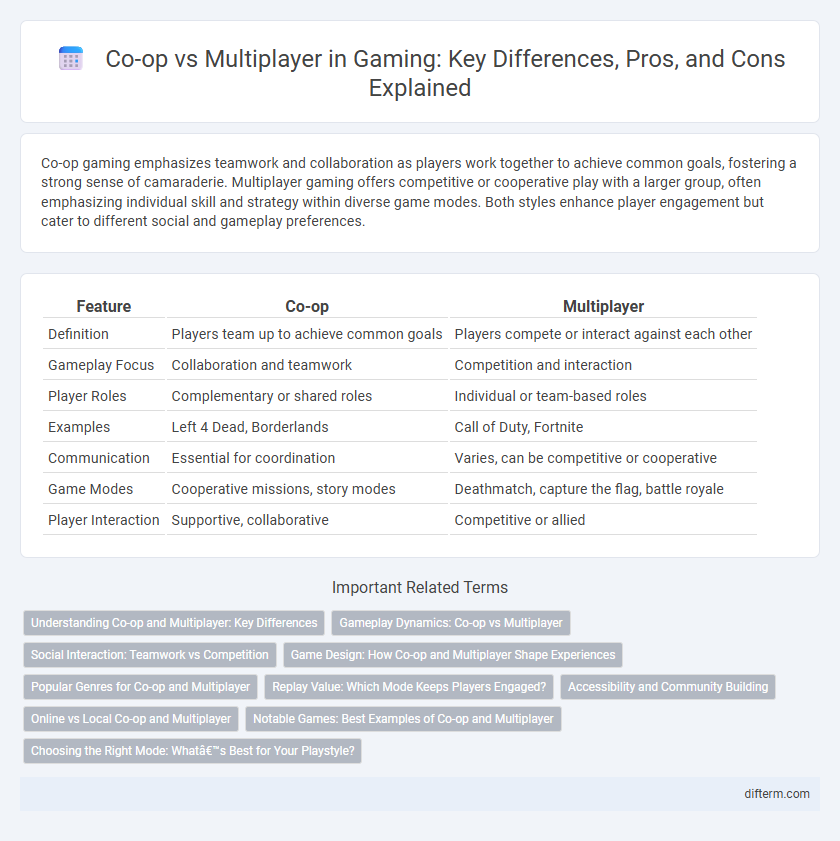Co-op gaming emphasizes teamwork and collaboration as players work together to achieve common goals, fostering a strong sense of camaraderie. Multiplayer gaming offers competitive or cooperative play with a larger group, often emphasizing individual skill and strategy within diverse game modes. Both styles enhance player engagement but cater to different social and gameplay preferences.
Table of Comparison
| Feature | Co-op | Multiplayer |
|---|---|---|
| Definition | Players team up to achieve common goals | Players compete or interact against each other |
| Gameplay Focus | Collaboration and teamwork | Competition and interaction |
| Player Roles | Complementary or shared roles | Individual or team-based roles |
| Examples | Left 4 Dead, Borderlands | Call of Duty, Fortnite |
| Communication | Essential for coordination | Varies, can be competitive or cooperative |
| Game Modes | Cooperative missions, story modes | Deathmatch, capture the flag, battle royale |
| Player Interaction | Supportive, collaborative | Competitive or allied |
Understanding Co-op and Multiplayer: Key Differences
Co-op gaming emphasizes teamwork as players collaborate to achieve shared objectives, often featuring a unified storyline or mission. Multiplayer gaming involves multiple players competing or interacting simultaneously, which can include both cooperative and competitive modes but often highlights player-versus-player experiences. Understanding these distinctions helps gamers choose titles that best suit their preferences for collaboration or competition.
Gameplay Dynamics: Co-op vs Multiplayer
Co-op gameplay emphasizes teamwork and strategic collaboration, requiring players to coordinate roles and share resources to overcome challenges together. Multiplayer dynamics often feature competitive interactions, where individual skill and tactics determine success in diverse game modes. Both formats enhance player engagement through social interaction but differ in pacing and objective focus, with co-op fostering unity and multiplayer encouraging rivalry.
Social Interaction: Teamwork vs Competition
Co-op gaming emphasizes teamwork and collaboration where players work together to achieve common objectives, fostering strong social bonds and communication skills. Multiplayer games often center on competition, encouraging strategic thinking and individual skill to outperform opponents, which enhances competitive spirit and rivalry. Both modes offer distinct social interaction experiences, with co-op building unity and multiplayer driving challenge through player-versus-player dynamics.
Game Design: How Co-op and Multiplayer Shape Experiences
Co-op game design emphasizes collaboration, fostering shared goals and communication among players to create a unified experience. Multiplayer design often centers on competition, balancing fairness and player interaction to maintain engaging dynamics. Both approaches shape player engagement differently, influencing game mechanics and social interaction models within the gaming environment.
Popular Genres for Co-op and Multiplayer
Popular co-op genres include action RPGs, survival games, and tactical shooters, where teamwork and strategy are essential for success. Multiplayer games span a wider range, with battle royales, MOBAs, and competitive shooters dominating due to fast-paced, large-scale player interactions. Both modes emphasize social engagement but cater to different gameplay experiences, with co-op focusing on collaboration and multiplayer on competition.
Replay Value: Which Mode Keeps Players Engaged?
Co-op mode enhances replay value by fostering teamwork and shared objectives, creating dynamic scenarios that evolve with different player strategies. Multiplayer mode maintains engagement through competitive challenges and diverse player interactions, constantly refreshing gameplay with unpredictable outcomes. Both modes drive replayability, but co-op's collaborative experiences often lead to deeper emotional investment and long-term player retention.
Accessibility and Community Building
Co-op gaming emphasizes accessibility by facilitating teamwork within smaller groups, making it easier for players of all skill levels to collaborate and enjoy shared objectives. Multiplayer modes foster expansive community building through large-scale interaction and competitive play, encouraging diverse social connections and ongoing player engagement. Both formats contribute uniquely to gaming culture by balancing inclusivity with dynamic social experiences.
Online vs Local Co-op and Multiplayer
Online co-op allows players to team up remotely, providing seamless connectivity and shared objectives across various platforms, enhancing the gaming experience with global interaction. Local co-op fosters in-person collaboration on a single device or system, promoting social bonding and immediate coordination through split-screen or shared controls. Multiplayer modes, whether online or local, emphasize competitive or cooperative gameplay, with online multiplayer offering expansive matchmaking and local multiplayer delivering intimate, face-to-face engagement.
Notable Games: Best Examples of Co-op and Multiplayer
Notable co-op games like "Left 4 Dead 2" and "Borderlands 3" emphasize teamwork with shared objectives and coordinated strategies to defeat AI-controlled enemies. Multiplayer examples such as "Call of Duty: Warzone" and "Fortnite" highlight competitive gameplay where individual skill and real-time player interaction shape the outcome. Both game types offer unique social experiences, with co-op fostering collaboration and multiplayer driving competition in virtual environments.
Choosing the Right Mode: What’s Best for Your Playstyle?
Co-op gaming emphasizes teamwork and shared objectives, ideal for players who enjoy collaboration and strategy with friends or AI partners. Multiplayer mode offers competitive gameplay, suited for those seeking challenges against diverse opponents and dynamic environments. Selecting the right mode depends on your preference for cooperative interaction or competitive intensity, with titles like "Overcooked" excelling in co-op and "Call of Duty" thriving in multiplayer arenas.
co-op vs multiplayer Infographic

 difterm.com
difterm.com